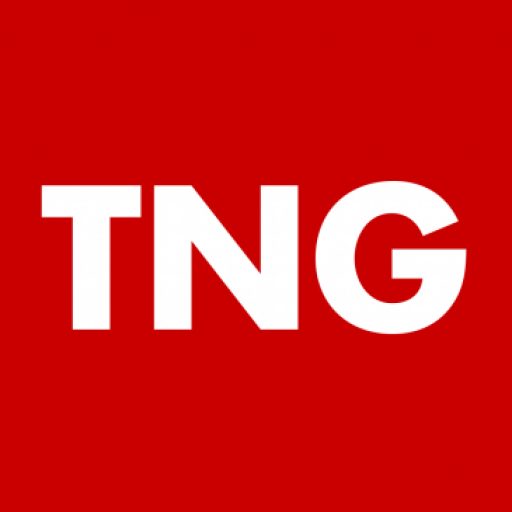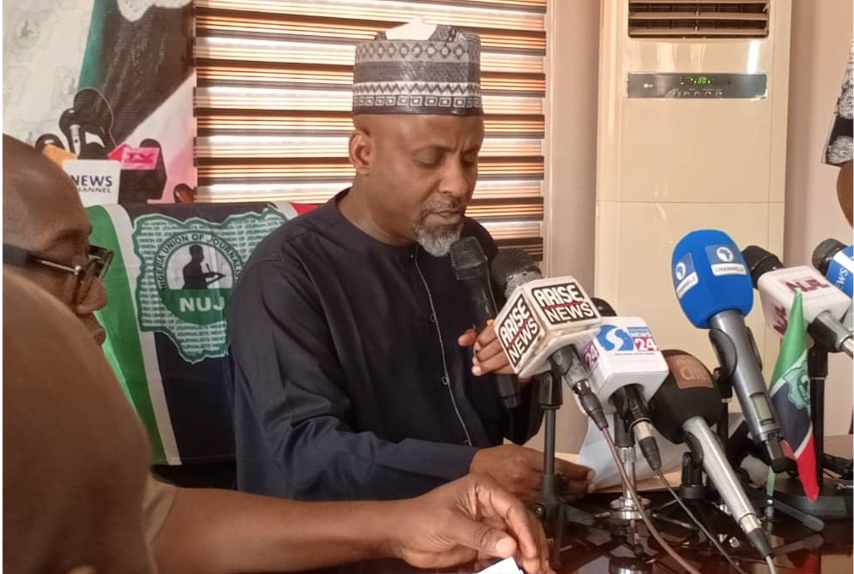As the Nigeria Union of Journalists (NUJ) marks its 70th anniversary, President of the Union, Comrade Alhassan Yahya has highlighted the challenges facing journalists in the country while charging them to be creative and innovative.
Comrade Yahya highlighted the challenges and gave the charge on Saturday at a press briefing at the NUJ National Secretariat in Abuja where he noted that for 70 years, the NUJ has remained a cornerstone of Nigeria’s democratic fabric.
Yahya noted that challenges besetting journalists in Nigeria to include low pay and poor staff welfare, which he said are driving skilled individuals away from the media industry.
The NUJ President stressed that unlike in other countries where media professionals are celebrated, in Nigeria, the sector is often overlooked, and that the safety and security of journalists remained a critical concern.
“Over the decades, Nigerian journalism has undergone a profound transformation. The formation of the NUJ in 1955 marked a watershed moment, solidifying our organisational structure and collective voice.
“The union’s restructuring in 1977, following the Abiodun Panel’s recommendations, was pivotal. Today, the NUJ boasts 36 state councils and the FCT, six zones, and over 740 chapels, with our National Secretariat now firmly established in Abuja.
“However, despite our significant contributions, Nigerian journalism and journalists face a multitude of challenges that demand urgent attention.
“Firstly, low pay and poor staff welfare are driving skilled individuals away from the media industry. Long hours, tight deadlines, and poor working conditions create an unhealthy environment, leading to stress-induced ailments and exposing journalists to risks on assignments.
“Secondly, unlike in other countries where media professionals are celebrated, in Nigeria, the sector is often overlooked. The glamour associated with the media has been eroded by the shabby treatment and poor remuneration of journalists and other media workers.
“Thirdly, there is a wide disparity in salary packages compared to other sectors.
“Fourthly, the safety and security of journalists remains a critical concern. Journalists face physical attacks, harassment, and arbitrary detention.
“Fifthly, we have encountered difficulties in establishing a robust accreditation and registration framework, leading to the proliferation of unqualified practitioners and the erosion of ethical standards.
“Eighthly, the influence of political and economic interests can compromise our independence and objectivity.
“Ninthly, the rise of misinformation and disinformation poses a serious threat to public discourse.
“And finally, technological disruption necessitates adaptation to changing consumption habits and combating hate speech and fake news,” Comrade Yahya said.
To navigate these challenges and secure a sustainable future, Yahya advised that Nigerian journalism must embrace a new paradigm of creative and innovative storytelling; accountable and responsive journalism, and investigative and critical journalism.
“By addressing the challenges outlined, investing in investigative journalism, upholding ethical standards, and embracing innovation, Nigerian journalism can forge a brighter future,” he said.
TNG reports Comrade Yahya disclosed at the press briefing that the NUJ will mark the 70th anniversary milestone with a series of commemorative activities, which he said will be unveiled in the coming weeks.
The text of the press briefing reads in full below:
Good morning, ladies and gentlemen of the press. It is with immense pride and a sense of historical significance that I appear before you today to mark the 70th anniversary of the Nigeria Union of Journalists.
Seventy years ago, on the 15th of March 1955, in the vibrant city of Lagos, the NUJ was born amidst the burgeoning nationalist movement.
Just as Nigeria was striving for self-determination, so too were journalists seeking to establish their professional identity and advocate for their rights. The NUJ emerged as a crucial platform, a voice for those dedicated to informing and empowering the nation.
Today, we pause to reflect on a remarkable journey – a journey characterised by resilience, adaptation, and an unwavering commitment to journalistic integrity. From the challenges of colonial rule and the fight for press freedom, to navigating the complexities of a rapidly evolving media landscape, the NUJ has remained a cornerstone of Nigeria’s democratic fabric.
This milestone provides us with a unique opportunity to examine our evolution, to chart our trajectory through decades of political upheaval, technological advancement, and societal transformation. We acknowledge the NUJ’s role in navigating military rule, the transition to civilian democracy, and the advent of digital media, all while striving to uphold the highest standards of professional practice.
However, this reflection is not merely a retrospective exercise. It is a moment to critically assess our present position and to consider the future of journalism in Nigeria. As the media landscape undergoes seismic shifts, driven by technological innovation and evolving audience expectations, the NUJ must adapt to remain relevant and effective.
Therefore, we must consider the strategies and initiatives necessary to ensure the Union’s continued relevance and its ability to empower journalists to play a pivotal role in shaping Nigeria’s future. We seek to provide a comprehensive analysis of our 70-year history, celebrating our achievements, acknowledging our challenges, and ultimately, charting a course for continued success.
We aim to understand how the NUJ has not only navigated change but also, crucially, how it can continue to chart a future that upholds the principles of free and fair journalism, and strengthens the foundations of Nigerian democracy.
Honouring the Pioneers:
For seven decades, the Nigeria Union of Journalists (NUJ) has served as a stalwart guardian of press freedom, professional integrity, and the welfare of journalists throughout the country. As we commemorate our 70th anniversary, we are profoundly aware of the bedrock established by those visionary individuals who dared to envisage a unified and empowered journalism body. Their fortitude, commitment, and unwavering conviction in the power of the press have shaped the very fabric of journalism within our nation. This year, we pause to honour and celebrate the invaluable contributions of our founding members, those pioneers who laid the first stones.
As George Orwell observed, “Journalism is printing what someone else does not want printed: everything else is public relations.” This sentiment underscores the vital role of a free press, a principle our founders held dear. The 70th anniversary of the NUJ is a moment to celebrate our rich history, acknowledge our present challenges, and look forward to the future with renewed determination. By honouring our founding members, we reaffirm our commitment to the core values that have guided us for seven decades. Their legacy will continue to inspire us as we strive to uphold the highest standards of journalism, serve the public interest with impartiality, and ensure that the freedom of the press endures for generations to come.
Over the decades, Nigerian journalism has undergone a profound transformation. The formation of the NUJ in 1955 marked a watershed moment, solidifying our organisational structure and collective voice. The union’s restructuring in 1977, following the Abiodun Panel’s recommendations, was pivotal. Today, the NUJ boasts 36 state councils and the FCT, six zones, and over 740 chapels, with our National Secretariat now firmly established in Abuja.
However, despite our significant contributions, Nigerian journalism and journalists face a multitude of challenges that demand urgent attention.
Firstly, low pay and poor staff welfare are driving skilled individuals away from the media industry. Long hours, tight deadlines, and poor working conditions create an unhealthy environment, leading to stress-induced ailments and exposing journalists to risks on assignments.
Secondly, unlike in other countries where media professionals are celebrated, in Nigeria, the sector is often overlooked. The glamour associated with the media has been eroded by the shabby treatment and poor remuneration of journalists and other media workers.
Thirdly, there is a wide disparity in salary packages compared to other sectors.
Fourthly, the safety and security of journalists remains a critical concern. Journalists face physical attacks, harassment, and arbitrary detention.
Fifthly, we have encountered difficulties in establishing a robust accreditation and registration framework, leading to the proliferation of unqualified practitioners and the erosion of ethical standards.
Eighthly, the influence of political and economic interests can compromise our independence and objectivity.
Ninthly, the rise of misinformation and disinformation poses a serious threat to public discourse.
And finally, technological disruption necessitates adaptation to changing consumption habits and combating hate speech and fake news.
To navigate these challenges and secure a sustainable future, Nigerian journalism must embrace a new paradigm:
1. Accountable and Responsive Journalism: Upholding public interest, even government activities. when reporting on
2. Investigative and Critical Journalism: Holding power to account, exposing corruption, and promoting transparency.
3. Creative and Innovative Storytelling: Harnessing digital technologies to engage audiences.
4. Global Perspective and National Interest: Embracing best practices while advocating for national interests.
5. Strengthening Media Literacy: Combating misinformation and fostering critical thinking.
6. Promoting Diversity and Inclusion: Ensuring the media reflects the diversity of the Nigerian society.
Furthermore, the International Institute of Journalism (II)) in Abuja, our training arm, must adapt and revitalise its role. We will ensure the IIJ focuses on:
• Digital journalism and media literacy.
• Ethical journalism and investigative reporting.
• Specialised training programmes.
Mentorship programmes. We will also continue to fight for:
• Fair wages
• Decent work environments.
Modern equipment.
Training and retraining.
Comprehensive insurance coverage.
• A revived National Monitoring Committee on Safety and Security of Journalists.
My dear colleagues, we are poised to mark this significant milestone with a series of commemorative activities, which will be unveiled in the coming weeks. These events will be a fitting tribute to the NUJ’s rich history and its tireless efforts.
As we observe our 70th anniversary, it is a time for reflection and renewal. By addressing the challenges outlined, investing in investigative journalism, upholding ethical standards, and embracing innovation, Nigerian journalism can forge a brighter future. The NUJ must play a leading role in this transformation.
Thank you very much, and may God bless you all.
Alhassan Yahya Abdullahi,
National President

